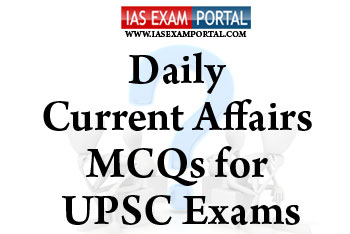Current Affairs MCQ for UPSC Exams - 06 November 2019

Current Affairs MCQ for UPSC Exams - 06 November 2019
Q1. Consider the following statements :
1) India accounts for 18% of the world population, whereas we have only 4% of
the world water resources that too with large temporal and spatial variability.
2) The National Hydrology project is an important scheme ensuring sustainable
usage of water resources .It has a coverage on Pan India basis and intends to
set up of a system for timely and reliable water resources data acquisition,
storage, collation, management and dissemination.
3) The project also seeks to build capacity of the State and Central sector
organisations in water resources management through the use of Information
Systems and adoption of State-of-the-art technologies.
Which of the above statements are true ?
a) 1 & 2 only
b) 2 & 3 only
c) 1 & 3 only
d) all of the above
Q2. Which of the following can be regarded a examples of Non-tariff Barriers in world trade economics ?
1) Customs duty
2) State trading
3) Subsidies
4) Preferential arrangement
5) Quantity restrictions and Quotas
a) 1,2& 3 only
b) 3,4 & 5 only
c) 2,4 & 5 only
d) 1,3 & 4 only
Q3. Recently, ministry of rural development has come out with the fifth edition of Wasteland Atlas -2019.Which of the following statements regarding the same stands true ?
1) According to the ministry, unprecedented pressure on the land beyond its
carrying capacity is resulting into degradation of lands in the country.
2) As per the report, majority of croplands have been converted into wastelands
over a period of 5 years.
3) However a reduction in wasteland area was observed in the categories of land
with dense scrub, waterlogged and marshy land, sandy areas, degraded pastures /
grazing land and gullied and / or ravinous land.
a) 1 & 2 only
b) 2 & 3 only
c) 1 & 3 only
d) all of the above
Q4. With respect to the first ever‘BIMSTEC Ports’ Conclave’ to be held in Vishakhapatnam. Which of the following statements stands true ?
1) The Ports of Bengal Initiative for Multi Sectoral Technical and Economic
Cooperation (BIMSTEC) is a regional organization comprising of seven Member
states lying in the littoral and adjacent areas of Bay of Bengal constituting a
contiguous regional unity.
2) The objective of BIMSTEC alliance was to harness trade and accelerated growth
with mutual cooperation in different areas of common interest by utilising the
regional resources and geographical advantage.
3) The diverse historical and cultural heritage of the BIMSTEC nations makes it
an ideal destination for tourism, in which the ports plays a vital role for
encouraging cruise tourism.
a) 1 & 2 only
b) 2 & 3 only
c) 1 & 3 only
d) all of the above
Q5. India has signed Free Trade Agreements ( FTA ) with majority of the proposed RCEP (Regional Comprehensive Economic Partnership ) countries. Which of the following countries is not amongst them ?
a) New Zealand
b) Japan
c) Srilanka
d) Thailand

